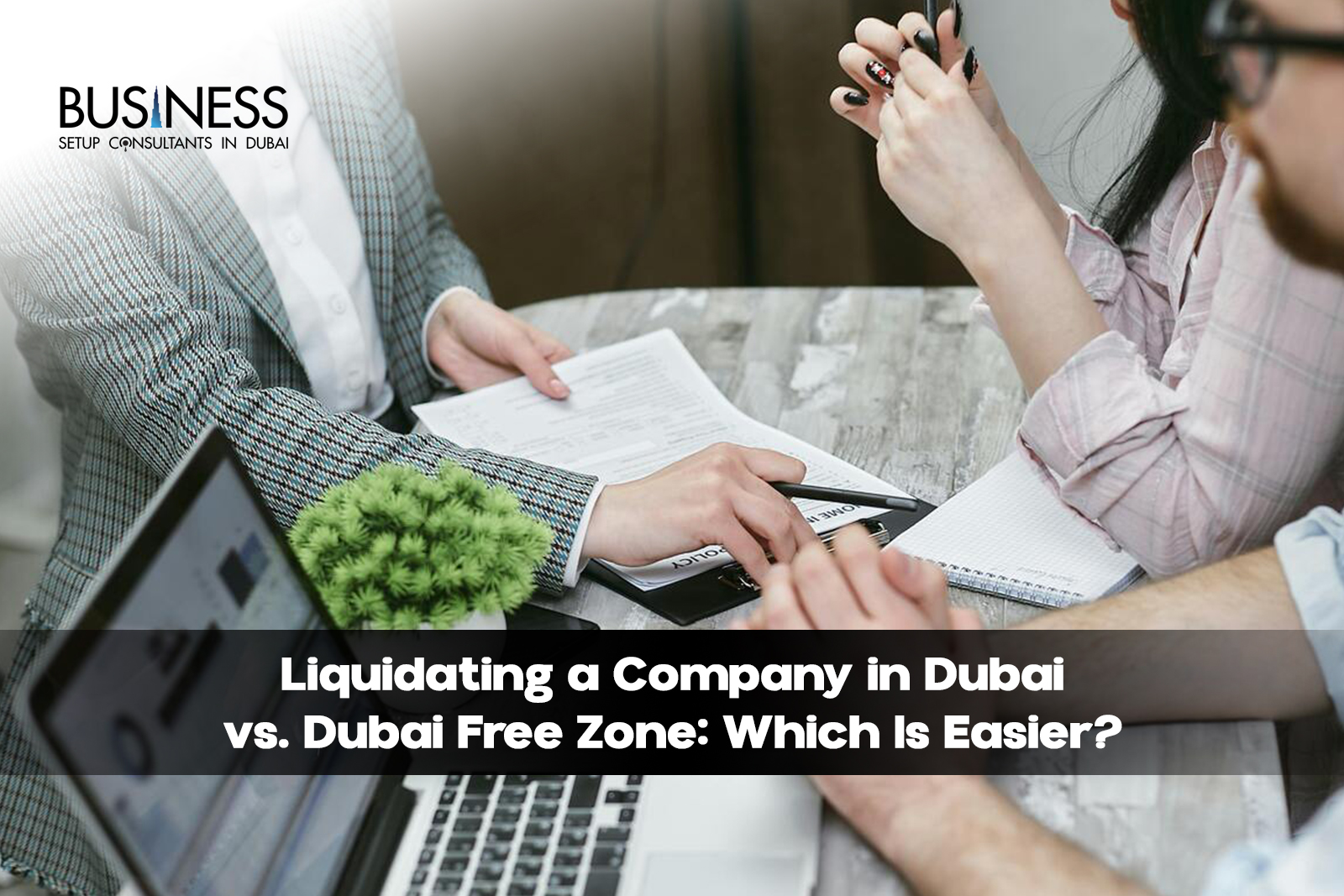In Dubai’s dynamic business environment, not every company’s journey ends with expansion and profits. Some businesses reach a natural conclusion, while others face financial or legal challenges that make closing down the best option. This is where company liquidation in the UAE becomes relevant.
Liquidation is the legal process of winding up a business, settling its debts, selling assets, and formally removing it from the trade register. In Dubai, there are two main pathways: voluntary liquidation and compulsory liquidation.
Understanding the differences between these two processes is essential for business owners, shareholders, and creditors. Choosing the right route can help protect your legal standing, minimise liabilities, and ensure compliance with UAE laws, including the UAE Bankruptcy Law.
What Is Company Liquidation?
Company liquidation is the formal closure of a business, where its assets are sold, debts are repaid, and the remaining funds (if any) are distributed to shareholders.
Main objectives:
- Asset Disposal: Selling company-owned property, stock, or equipment.
- Debt Repayment: Clearing outstanding liabilities with creditors, suppliers, and employees.
- Legal Closure: Deregistering the business from government records and cancelling trade licences.
Key Terms:
- Solvent Liquidation: The company can pay all its debts before closure.
- Insolvent Liquidation: The company cannot meet its financial obligations.
What is Voluntary Liquidation in Dubai?
Voluntary liquidation in Dubai occurs when shareholders decide to close a company without being forced by a court. Reasons include completion of business objectives, restructuring, or owner retirement. There are two different types of Voluntary Liquidation in Dubai.
- Members’ Voluntary Liquidation (MVL) – For solvent companies able to pay all debts.
- Creditors’ Voluntary Liquidation (CVL) – For insolvent companies where shareholders initiate closure.
Key Legal Requirements
- Passing a shareholder resolution for liquidation in the UAE.
- Filing a declaration of solvency (for MVL).
- Appointing a liquidator in Dubai.
Step-by-Step Process of Voluntary Liquidation in Dubai
- Prepare and notarise the shareholder resolution.
- Appoint a liquidator in Dubai (licensed audit firm).
- Publish a liquidation notice in a Dubai newspaper.
- Notify relevant authorities (DED, free zone authority, etc.).
- Settle debts, employee dues, and supplier payments.
- Sell company assets and distribute proceeds.
- Deregister trade licence and cancel visas.
Costs, Timeframes & Documents
- Duration: Usually 2–3 months.
- Documents: Trade licence, MOA, shareholder resolution, final audit report, employee settlement proof, clearance from utilities and banks.
What is Compulsory Liquidation in Dubai?
Compulsory liquidation in Dubai happens when a court orders the closure of a company, often due to insolvency, creditor petitions, or legal violations.
Legal Framework in Dubai
- Governed by the UAE Bankruptcy Law.
- Creditors can petition the court if debts remain unpaid.
- Government authorities may also initiate proceedings.
Step-by-Step Process of Company Liquidation in Dubai
- Creditor or authority files a court petition.
- The court reviews and appoints an official liquidator.
- Liquidator freezes company assets.
- Verification of claims by creditors.
- Sale of assets and debt repayment (priority given to secured creditors).
- Settlement of employee dues.
- Final liquidation report submitted to the court.
Costs, Timeframes & Documents
- Duration: Often more than six months.
- Costs: Court fees, legal representation, publication fees.
- Documents: Court petition, creditor agreements, company records.
D/B Voluntary Liquidation and Compulsory Liquidation in Dubai
How do the two types of company liquidation in Dubai differ from each other? Here’s a detailed explanation below:
| Aspect | Voluntary Liquidation in Dubai | Compulsory Liquidation in Dubai |
| Definition | A company’s shareholders (and sometimes creditors) decide to wind up the business voluntarily. | A court orders the company to wind up, usually due to insolvency or non-compliance with legal obligations. |
| Initiated By | Shareholders (Members’ Voluntary Liquidation – MVL) or Creditors (Creditors’ Voluntary Liquidation – CVL). | Creditors, regulatory authorities, or sometimes the company itself can do so through a legal petition. |
| Reason / Trigger | – Business has achieved its purpose.- Restructuring of operations.- Retirement of owners.- Insolvency where shareholders agree to close down. | – The company is unable to pay its debts.- Breach of UAE laws or regulations.- Fraudulent activity.- Court order due to creditor petitions. |
| Legal Basis | Governed by the UAE Commercial Companies Law and free zone regulations, where applicable. | Governed by the UAE Commercial Companies Law and court directives. |
| Financial Position Requirement | Can be solvent (MVL) or insolvent (CVL). A solvency declaration is required for MVL. | Generally insolvent or in severe legal breach. |
| Control Over Process | Controlled by shareholders (MVL) or creditors (CVL) with the liquidator overseeing the process. | Controlled entirely by the court-appointed liquidator under court supervision. |
| Appointment of Liquidator | Appointed by shareholders or creditors. | Appointed by the court. |
| Role of Liquidator | – Realise assets.- Settle debts.- Distribute remaining assets to shareholders. | – Investigate company affairs.- Realise assets.- Repay creditors.- Report to court. |
| Notice & Public Announcement | Required in an official gazette/newspaper as per UAE law or free zone authority requirements. | Public announcement made as part of the court order and liquidation process. |
| Creditor Involvement | Creditors are informed and may submit claims; in CVL, creditors have significant control. | Creditors are central; they initiate and participate in legal proceedings for debt recovery. |
| Court Involvement | Minimal in MVL, more in CVL (if disputes arise). | Mandatory and continuous until liquidation is complete. |
| Timeframe | Generally faster (can be a few months if no disputes). | Often longer due to court procedures, investigations, and creditor claims. |
| Cost | Lower, since it avoids prolonged legal battles (varies by complexity). | Higher due to legal fees, court costs, and the extended process. |
| Impact on Directors | Directors cooperate with the liquidator; minimal legal risk if no wrongdoing. | Directors may face investigation, personal liability, or disqualification if misconduct is found. |
| Debt Settlement | Settled from the sale of assets; surplus (if any) returned to shareholders. | Assets sold and distributed according to legal priority: secured creditors, unsecured creditors, then shareholders. |
| Distribution of Remaining Assets | After debts, remaining assets go to shareholders. | Shareholders receive assets only after all creditors are fully paid (rare in insolvency cases). |
| Regulatory Filings | – Notify licensing authority.- Cancel visas and work permits.- Submit final accounts and tax returns. | Similar filings but done under court supervision; more extensive reporting. |
| Tax & Compliance Obligations | VAT deregistration, corporate tax filings, and clearance from government authorities. | Same obligations, but may be handled directly by the liquidator with court approval. |
| Final Outcome | The company is legally dissolved and removed from the registry. | The company is legally dissolved and removed from the registry after the court’s final decree. |
| Best Suited For | Businesses winding up in an orderly manner, either solvent or with cooperative creditors. | Businesses are in severe financial distress, facing fraud cases, or are being pursued by creditors for legal closure. |
| Example Scenario | A profitable company closes after its owners retire, and no succession plan is in place. | A company fails to repay bank loans, and the bank petitions the court for liquidation. |
Common Challenges During Company Liquidation in Dubai
- Delays in securing approvals and clearances from DED, free zone authorities, FTA, and utility providers.
- Unsettled employee dues or pending visa cancellations are delaying the process.
- Disputes with creditors, suppliers, or shareholders leading to legal complications.
- Incomplete or incorrect documentation, such as missing audit reports or MOA issues.
- Challenges with VAT deregistration and obtaining final tax clearance.
Why Professional Guidance Matters in Liquidation
- Ensures all legal and regulatory steps are completed correctly and on time.
- Handles communication with government authorities, banks, and liquidators.
- Manages debt settlements, employee dues, and tax obligations efficiently.
- Prevents penalties, compliance gaps, and unnecessary delays.
- Provides business owners with a smooth and stress-free closure of their company.
Conclusion
Whether you choose voluntary liquidation or face compulsory liquidation, understanding the process in Dubai is essential for protecting your interests and complying with the law. Voluntary liquidation gives more control and is generally faster, while compulsory liquidation is driven by the courts, often due to insolvency or legal violations.
In both cases, appointing a qualified liquidator, settling debts in the right order, and completing all regulatory clearances are crucial steps. By knowing the differences, you can make better decisions, reduce legal risks, and close your business in a way that’s transparent, compliant, and fair to all parties involved.
At Business Setup Consultants in Dubai, we understand that sometimes closing a company is the best strategic decision for business owners. Therefore, we also provide reliable company liquidation assistance to make the process as smooth as possible. From guiding you through the legal requirements and documentation to coordinating with licensed liquidators and government authorities, our team ensures you meet all compliance obligations with minimal stress. Whether it’s a voluntary closure or a court-ordered liquidation in Dubai, we are here to support you every step of the way, so you can bring your business affairs to a proper and timely close.
Frequently Asked Questions (FAQs)
1. What does company liquidation mean in Dubai?
Company liquidation in Dubai is the legal process of closing a business, selling its assets, paying off debts, and removing it from the trade register. Once liquidation is complete, the company no longer exists as a legal entity.
2. What is the main difference between voluntary liquidation and compulsory liquidation?
In voluntary liquidation, the shareholders (and sometimes creditors) decide to close the business on their own. In compulsory liquidation, the closure is ordered by a court, often because the company is unable to pay its debts or has broken UAE laws.
3. When should a business choose voluntary liquidation?
Voluntary liquidation is ideal when a company:
- Has achieved its business goals
- Wants to restructure or close peacefully
- The owners are retiring
- Is insolvent but wants to manage closure without court intervention
4. What are Members’ Voluntary Liquidation (MVL) and Creditors’ Voluntary Liquidation (CVL)?
- MVL – For solvent companies that can pay all their debts before closure.
- CVL – For insolvent companies where shareholders initiate closure, but creditors are also involved in the process.
5. What triggers compulsory liquidation in Dubai?
Compulsory liquidation is usually triggered when:
- The company cannot pay its debts
- Creditors file a petition in court
- The company breaches UAE laws or regulations
- Fraud or misconduct is discovered
6. Who appoints the liquidator in each type of liquidation?
- Voluntary liquidation – The liquidator is appointed by the shareholders or creditors.
- Compulsory liquidation – The liquidator is appointed by the court.
7. How long does the liquidation process take in Dubai?
- Voluntary liquidation – Usually takes 2–3 months if there are no disputes.
- Compulsory liquidation – Can take over 6 months due to court procedures and investigations.
8. What happens to company debts during liquidation?
The company’s assets are sold to repay debts. In compulsory liquidation, secured creditors are paid first, followed by unsecured creditors, and shareholders are paid last (if anything is left).
9. Can directors face legal action during liquidation?
In voluntary liquidation, directors usually do not face legal issues if they have acted properly. In compulsory liquidation, directors may be investigated for misconduct, fraud, or negligence, and can face personal liability.
10. What documents are needed to liquidate a company in Dubai?
Some common documents include:
- Trade licence
- Memorandum of Association (MOA)
- Shareholder resolution for liquidation
- Final audit report
- Proof of debt settlements
- Clearance from utilities, banks, and relevant authorities










